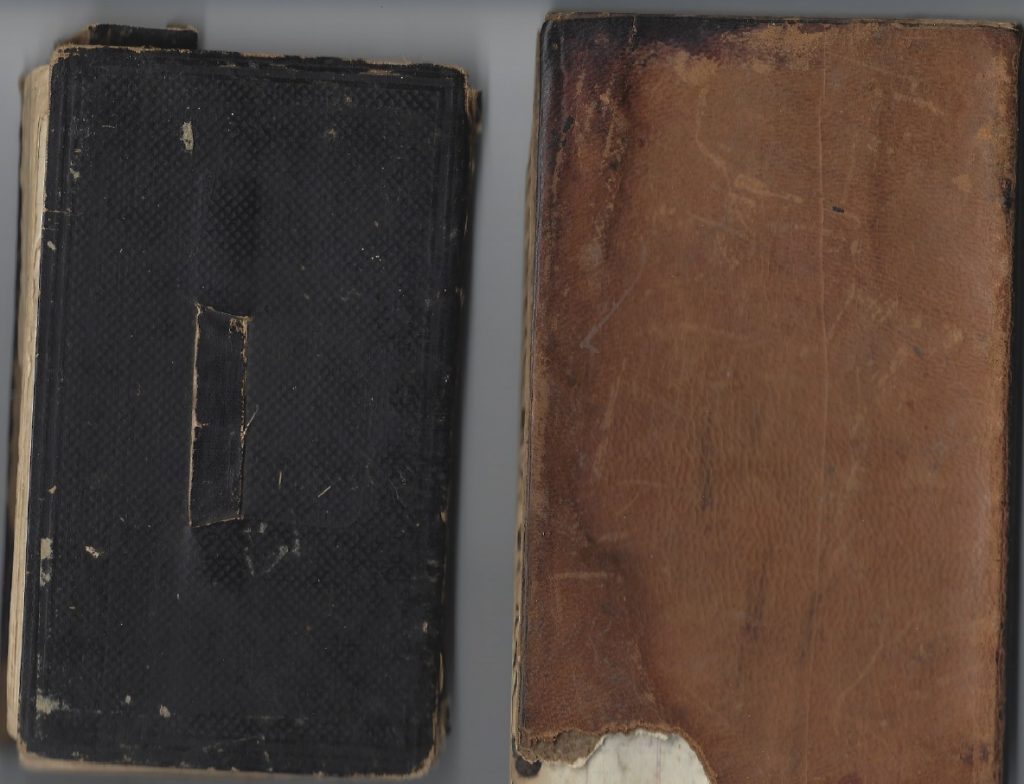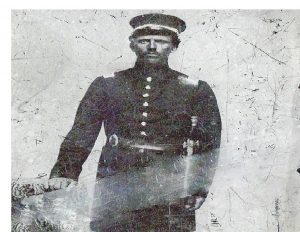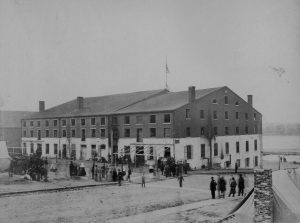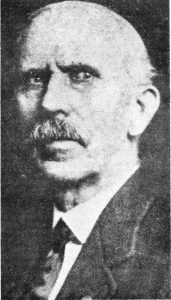A Hidden Gem of a Civil War Diary

Several weeks ago, I was contacted by a member of a large Midwestern Civil War round table following my Zoom presentation. “I am in possession of an original diary of a First Lieutenant of Company G, 21st Illinois who was captured at the battle of Chickamauga and taken to Libby Prison before being exchanged,” the email read. Those of us who are serious about reading, researching, and writing history understand the importance of first-hand accounts, especially those written in real time. When corroborated by other primary sources, diaries provide us with intimate insights into important historical events. When presented with such news, my initial rush of excitement is usually tempered by experience. Most diaries feature pedestrian content: daily weather briefings, reports on the soldier’s latest bout with illness, and camp hijinks. Mundane details have historical value but do not set my heart racing; however, this diary was different.
Late in life, Songer summarized his first year of service. He enlisted at Xenia, Illinois in early May 1861. “To say that we were a green, awkward set of men would be stating it in mild form,” he recalled. Songer and his brother Samuel joined Company G, 21st Illinois Volunteer Infantry. Once ten companies had arrived in Springfield, the men elected Captain S.S. Good of Company A as colonel because he was “a tall man of military bearing” and his company had been the first to report. The officers quickly realized that they had made a mistake in selecting Good, as he was lax in enforcing discipline. In late May, they promised Governor Yates that they “would reenlist for three years if we could get a competent colonel to command us.” Yates promoted a mustering captain to colonel to replace Good. His name was Ulysses S. Grant.
Grant marched “an unruly set of men” to Quincy, Illinois, rather than transporting them via rail “as a good way to discipline” them. “I don’t think there was an officer but what really feared him, and if they did not, they sure respected him,” Songer remembered. In early August, a few weeks after Grant had been promoted to brigadier general, he visited the critically ill Songer in the hospital. Songer’s fellow officers expected that Grant, being a West Point graduate, would be made a general officer soon, “but little did we think of him ever being promoted as he was later.”

Songer reviewed his service through the battle at Fredericktown, Missouri but his wartime diary entries began three months before the siege at Corinth, Mississippi in May 1862. Songer mentioned the big fight at Perryville, Kentucky and included a detailed description of the battle of Stones River, where the 21st Illinois suffered 309 casualties at Murfreesboro out of 800 men engaged. He complained about the Austrian rifles they were issued to replace their old Harper’s Ferry muskets. “After the battle our men picked up enough Springfield and Enfield guns to do them…they would swap with dead men without asking questions.” Songer recounted the hot skirmish at Liberty Gap and the march into northern Alabama and Georgia that culminated in the bloody battle of Chickamauga.
The 21st Illinois was part of General William P. Carlin’s brigade in Jefferson C. Davis’s division of the Twentieth Corps in William S. Rosecrans’s Army of the Cumberland. On September 19, 1863, Carlin’s brigade was heavily engaged and suffered significant casualties near the Viniard farm. The 21st Illinois left their colors on the field and Songer’s captain was wounded, leaving him in command of Company G. With the regiment decimated, Songer worried what the next day would bring. “It could not be foretold, it looked gloomy.” He was about to witness one of the greatest tactical blunders in the annals of American warfare.
Around 11:20 in the morning, Thomas J. Wood’s division was executing what he predicted would be “the fatal order of the day,” evacuating their position in line to fill a gap to the north that Rosecrans mistakenly thought existed. The ensuing void was directly to Carlin’s left when General James Longstreet’s Confederates rushed in. To make matters worse, “there was nothing connecting with the 21st on our right,” Songer explained. Colonel John Alexander of the 21st Illinois was killed while the 81st Indiana on his left was in full retreat, “which left us standing out alone, a heavy line sweeping down on us, and beside passing round our left flank, so it seemed there was nothing we could do only to surrender which was a bitter pill to take.” Half of the shattered remnants of the 21st Illinois, 120 men, were taken prisoner. They boarded trains headed south the following day.
Songer’s seventeen months as a prisoner of war is a fascinating account of life in five different Confederate prisons amid the frantic shuffling of Union captives during the latter stages of the war. He was originally held at Libby Prison in Richmond, where cold conditions, substandard rations, and abundant lice took their toll. Songer complained that care packages from friends and the Sanitary Commission were doled out liberally to officers like himself at the expense of men in the ranks. Performances by the Libby Minstrels, a troupe of incarcerated entertainers, were an occasional distraction. One day, recently escaped Confederate cavalry commander John Hunt Morgan visited and had a long conversation with Abel D. Streight. Morgan boasted that he was kindly treated while imprisoned in Ohio. “That was more than Colonel Streight could say,” lamented Songer.

Perhaps the most interesting entries in the Songer diaries recount frequent escape attempts by his comrades. On November 24, 1863, Major White stole away from prison disguised as a surgeon but was soon recaptured after another inmate betrayed him. Five weeks later, Major Bates and a few others dressed in citizens’ clothing and slipped out in broad daylight. Songer’s account of the famous February 9, 1864 escape of 109 prisoners through a tunnel is consistent with later recollections of Colonel Thomas E. Rose of the 77th Pennsylvania Infantry, who devised the escape plan.
By the middle of May 1864, Songer found himself imprisoned at Camp Oglethorpe near Macon, Georgia. Fifty-one prisoners had managed to escape while en route. A Catholic priest gave Songer and his comrades a gruesome account of his recent visit to the prison at nearby Andersonville. Songer believed that prisoners there were being intentionally starved and mistreated “so they would never be able for service again in the army and with the full knowledge of Jeff Davis and his Cabinet.” He compared healthy-looking rebel prisoners who were recently exchanged to “walking skeletons” from Andersonville.
On June 27, 1864, Lieut. Berry escaped through a tunnel under the latrine. When Confederate guards investigated, they found three tunnels under construction. That evening, work began on a hillside clearing that would train artillery on the camp to discourage escape attempts. Despite heightened security measures, Union prisoners gathered to celebrate the Fourth of July with songs, speeches, and a homemade national flag until ordered to disperse. By the middle of July, Camp Oglethorpe was emptied of officer prisoners and Songer was transported to the city workhouse at Charleston, South Carolina.
Charleston was a hazardous place to live in the summer and early fall of 1864. Union guns bombarded the city, destroying hundreds of buildings and setting entire squares afire. Yellow fever hit the prison in late September killing Lieut. Anderson who slept just ten feet from Songer. On October 5, the prison was evacuated and the officers sent to a new location across the river from Columbia, S.C.
Escape attempts became common as groups of two to five soldiers attempted to “run the guard” on dark nights. Songer was unable to try his luck, since he was experiencing frequent bouts of night blindness, likely brought on the constant concussions at Charleston. On November 4, more than 300 prisoners escaped by mixing with paroled prisoners who were gathering pine boughs for shelter. Most were apprehended. Despite the circumstances, polls opened in the prison camp on November 9 for the 1864 presidential election. Lincoln outpolled McClellan five to one. On December 12, Union officers were moved to an insane asylum within the city where they lived in an open yard with no shelter. Four days later, captive officers of the 21st Illinois wrote General Ulysses S. Grant, pleading for an exchange. Songer kept a copy of that letter in his diary.
Songer and his fellow officers left Columbia on February 15, 1865, bound for Charlotte, North Carolina. Hopes ran high, so they named their new abode Camp Exchange. Four days later, Songer and 200 others were on their way to Goldsboro, where they were finally paroled on February 28. Songer described his exchange on March 1 and subsequent travel home on leave, abandoning his tattered, lice-infested duds in the changing room of a clothing store. He mustered out on May 15 after serving four years and five days.

These are just a few highlights from this interesting artifact. Hundreds, perhaps thousands of soldiers’ diaries lay undiscovered in attics or held in private collections where Civil War scholars have little access to them. Perhaps an enterprising group of history graduate students should create an online database of Civil War diaries to make it easy for researchers to find them in various repositories across the country. In the meantime, if you own diaries or correspondence, please consider scanning, transcribing, and/or donating them to your state archives or historical society. What may seem to be random scribbles from a distant ancestor might turn out to be an important primary source for Civil War historians.
David T. Dixon is the author of Radical Warrior: August Willich’s Journey from German Revolutionary to Union General (2020 Univ. of Tennessee Press).
Wow! What a find.
Great read. This line has set me to thinking..
“A Catholic priest gave Songer and his comrades a gruesome account of his recent visit to the prison at nearby Andersonville. Songer believed that prisoners there were being intentionally starved and mistreated “so they would never be able for service again in the army and with the full knowledge of Jeff Davis and his Cabinet.””
You often her a questions today when a potential political scandal is taking place: what did he know, and when did he know it?” Did the Confederate and Union leaders, military and civilian, know the extent of the bad conditions at certain POW camps, and was that ever addressed by them?
Great stuff. Really fascinating. I like prison writing that was created during the war, rather than the post-war narratives that took on a particular cast.